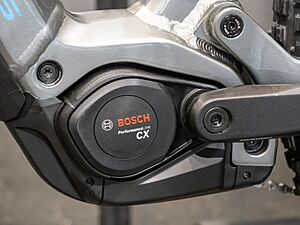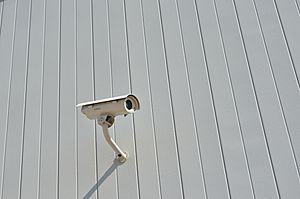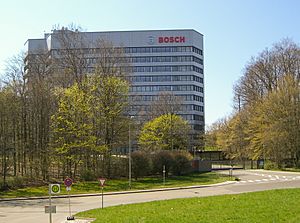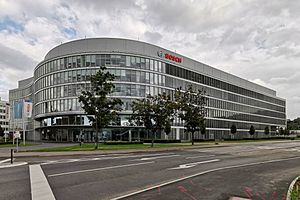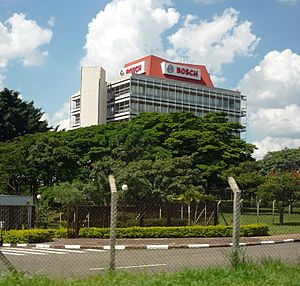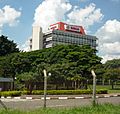Bosch (company) facts for kids
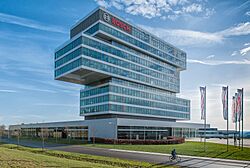
Corporate Sector Research and Advanced Development in Renningen, Germany
|
|
| Private | |
| Industry | Conglomerate |
| Founded | 15 November 1886 |
| Founder | Robert Bosch |
| Headquarters | Robert-Bosch-Platz 1, 70839 Gerlingen, Baden-Württemberg, Germany |
|
Area served
|
Worldwide |
|
Key people
|
Stefan Hartung (CEO, CTO, and CDO) |
| Products |
|
| Revenue | |
|
Operating income
|
|
| Total assets | |
| Total equity | |
| Owners | Robert Bosch Stiftung (92%) Bosch Family (8%) |
|
Number of employees
|
429,416 (2023) |
| Subsidiaries |
|
Robert Bosch GmbH, often called Bosch, is a big German company. It works in many areas like engineering and technology. Bosch has its main office in Gerlingen, Germany.
Robert Bosch started the company in Stuttgart in 1886. What's cool is that most of Bosch (92%) is owned by a charity called the Robert Bosch Stiftung. This charity uses its money to help with health and social causes.
Bosch has four main business groups. These include things for cars, products for homes (like appliances and tools), industrial technology, and energy and building technology. Bosch is actually the biggest supplier of parts for cars in the world!
Contents
History of Bosch
Early Years (1886–1920)
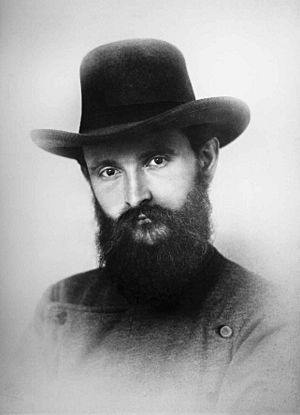
Bosch began in a small workshop in Stuttgart in 1886. It was called the "Workshop for Precision Mechanics and Electrical Engineering."
The very next year, Bosch created a special device called a magneto for gas engines. This device helped engines start.
By 1897, Bosch started putting these magneto ignition devices into cars. This made them an important supplier for the growing car industry. In 1902, a Bosch engineer named Gottlob Honold invented the high-voltage magneto ignition system with a spark plug. This was a big step forward for cars.
In 1901, Bosch opened its first factory in Stuttgart. By 1906, they had made 100,000 magnetos. That same year, Bosch was one of the first companies to give its workers an eight-hour workday.
The company grew very fast as more cars were made. In 1901, Bosch had 45 employees. By 1908, they had over 1,000!
Bosch also started to grow around the world. In 1898, they opened an office in London. Soon after, they had offices in Paris, Vienna, and Budapest. By 1909, Bosch had partners on every continent. They opened their first factory outside Germany in Paris in 1905. Their first factory on another continent was in the USA in 1912.
In 1917, Bosch became a larger company structure. Robert Bosch later bought back all the shares in 1937, making it a private company again.
Growth and New Products (1920s–1945)
After the First World War, Bosch had to rebuild its international business. They opened new offices in South America and Asia. For example, in 1922, they started selling products in India.
In the 1920s, Bosch added many new products for cars. These included electric horns (1921), windshield wipers (1926), and turn signals (1927).
In 1927, Bosch introduced injection pumps for diesel engines. Bosch also started making gas appliances in 1932. They developed their first electric drill and car radio in 1932. In 1933, Bosch showed its first electric refrigerator for homes.
Bosch During Wartime
In the 1930s, Bosch worked with the government to build factories for making military equipment. These factories were kept secret. They made parts for aircraft and vehicles.
During the war, many people worked in these factories. Some of these workers were forced to work there. For example, at the Dreilinden Maschinenbau GmbH factory, many forced laborers and prisoners worked. They made parts for German aircraft. Another factory in Hildesheim made electrical parts for tanks and trucks.
Bosch's production spread out to many different locations during the war. This helped them keep making things.
Bosch in the 21st Century
In 2001, Bosch bought Mannesmann Rexroth AG, which became Bosch Rexroth AG. They also opened new testing and development centers.
In 2002, Bosch bought Philips CSI. This company made security and communication products like CCTV cameras.
In the 2000s, Bosch created new technologies. These included electric hydraulic brakes and improved fuel injection systems for cars. They also made a cordless screwdriver with a lithium-ion battery in 2003.
Bosch has won awards for its innovations. In 2005 and 2008, they received the German Future Prize.
By 2009, Bosch was investing a lot in research and development. They published about 3,900 patents each year. They focused on making things more energy-efficient and using renewable energies. They also planned to invest in new areas like biomedical engineering.
China is a very important market and manufacturing place for Bosch. In 2012, Bosch had 34,000 employees in China.
Bosch has continued to grow by buying other companies.
- In 2012, they bought SPX Service Solutions.
- In 2014, Bosch took full ownership of BSH Bosch and Siemens Hausgeräte GmbH, which makes home appliances.
- In 2015, Bosch took full ownership of ZF Lenksysteme, a steering systems company.
- Also in 2015, Bosch bought Seeo, Inc., a company working on advanced batteries.
In 2021, Bosch opened a new factory for making semiconductor chips. This was their biggest investment in a single project. In 2022, Bosch bought Five.ai, a company that works on self-driving technology. They also bought Arioso Systems, which makes tiny speakers.
In July 2022, Bosch announced plans to invest about 3 billion euros in chip production and research over the next four years. They are building new facilities in Dresden and Reutlingen, Germany. They focus on chips used in the automotive industry.
In September 2023, Bosch bought TSI Semiconductors, a company that makes special power devices. In July 2024, Bosch announced they would buy the heating and air conditioning parts of Johnson Controls.
Environmental Concerns and Software
In 2006, Bosch helped develop software for some car manufacturers. This software caused cars to release more harmful gases than allowed by environmental rules.
Bosch supplied this software to various car makers. Because of this, cars with Bosch's devices polluted more.
Bosch later agreed to pay money to customers in the United States. This was to make up for its role in creating the software. They also paid fines for their connection to the issue.
How Bosch Works
Bosch Group's businesses are divided into four main areas.
Industrial Technology
This part of Bosch makes up about 10% of its sales. It includes the Drive and Control Technology division. This division creates special parts for factory automation and machinery.
Another part, Packaging Technology, makes machines for packaging food and medicine. In 2018, Bosch decided to find a new owner for this business.
Bosch also has a unit called Bosch Connected Industry. This unit develops software and projects for smart factories.
In January 2020, Bosch Packaging Technology became a new company called Syntegon.
Consumer Goods
The Consumer Goods sector makes up about 23% of Bosch's sales. This includes their Power Tools division. They make power tools like hammer drills, cordless screwdrivers, and jigsaws. They also make gardening tools like lawnmowers and hedge trimmers. Bosch focuses on powerful cordless tools and smart tools that connect to the internet.
Bosch is also a top maker in the e-bike industry. They offer motors, batteries, and digital services for e-bikes. Their eBike Systems division started in 2009.
This sector also includes BSH Hausgeräte GmbH. This company makes many modern home appliances. These include washing machines, refrigerators, ovens, dishwashers, and small appliances like vacuum cleaners and coffee makers.
Some brands in this sector are:
- Dremel
- Siemens (under a special agreement)
- Constructa-Neff
- Gaggenau Hausgeräte
- Thermador
Energy and Building Technology
This sector made up 7% of Bosch's sales in 2019. Its Building Technologies division makes security and communication products. These include video surveillance, fire alarms, and access control systems. They also make professional audio and conference systems.
The Thermotechnik GmbH division makes systems for air conditioning and hot water. They provide heating systems for homes and businesses.
Bosch Global Service Solutions offers services for other companies. These include services for the car, travel, and logistics industries.
Robert Bosch Smart Home GmbH makes smart home products. These products connect to the internet and can be controlled with an app.
Brands in this sector include:
- Dynacord
- Electro-Voice
- Telex
- Worcester Bosch
- Junkers
Other Business Areas
Bosch also has other important businesses:
Bosch Healthcare Solutions GmbH was started in 2015. This company offers products and services for healthcare and medical technology. In March 2020, they announced a fast test for detecting the coronavirus. This test can be done quickly where a person is, without sending samples away.
The Grow Platform GmbH is a company that helps new ideas and start-ups grow within Bosch.
Robert Bosch Venture Capital GmbH (also called Bosch Ventures) invests in new and innovative start-up companies around the world. They look for companies working on things important to Bosch's future, like automation, energy efficiency, and healthcare.
Bosch Locations Around the World
Bosch has a huge network of over 468 smaller companies and offices. They work in more than 60 countries. If you include their sales and service partners, Bosch's network covers almost every country. About 90,100 people work in research and development for Bosch in 125 locations worldwide.
Bosch in the UK
In the UK, Bosch's main office is in Denham, Buckinghamshire. They have about 5,200 employees there. There are also around 40 other Bosch locations across the country. These include places like Coventry, Liverpool, and Worcester.
In the UK, Bosch sells and supports all its products. They also make boiler systems, mobile hydraulics, and packaging machinery. They produce lawn and garden products too.
In March 2019, Bosch opened its London Connectory. This is a special "co-innovation space" where different groups can work together on new ideas.
Bosch in the Americas
In North America, Robert Bosch LLC has its main offices in Farmington Hills, Michigan and Plymouth, Michigan. They have three research centers in places like Pittsburgh, Pennsylvania and Sunnyvale, California. Bosch has factories and distribution centers in many US cities. There are also two main offices in Brazil and ten in Mexico.
In North America, Bosch has about 24,750 employees in 80 locations.
In May 2015, Bosch Security Systems opened a new distribution center in Greer, South Carolina. This center helps store and ship over 50,000 different products for security and audio systems.
In 2017, Bosch opened its first "Connectory" for the Internet of Things (IoT) in Chicago, Illinois. This is a space for working on new IoT ideas.
Bosch in India
Bosch first came to India in 1922. For many years, they only sold imported products there. In 1951, a company called Motor Industries Company Ltd. (MICO) was started. Bosch bought a large part of this company.
MICO became the main seller for Bosch in India. In 1953, a factory was built in Bangalore to make Bosch products. They also started training young people there. By 1961, 2,000 people worked at the Bangalore plant. Bosch bought more shares of MICO over time. In 2008, MICO was renamed Bosch Limited.
Bosch India has a big business with over 31,000 employees. They have 10 locations and 7 development centers. Most of their money comes from their car business. But they also work in packaging, energy, building, power tools, and consumer retail.
Bosch also has large research and development centers in India. These are in places like Pune and Bangalore. This is Bosch's biggest R&D operation outside Germany. In 2014, Bosch launched a special eye-care system in India. It helps provide affordable eye care.
In 2022, Bosch's engineering and software company in India changed its name to Bosch Global Software Technologies.
Working with Other Companies
BSH Hausgeräte
BSH Hausgeräte GmbH is one of the top three home appliance companies in the world. Bosch bought all shares in this company in 2014. BSH is the market leader in Germany and Western Europe. It includes well-known brands like Bosch, Siemens, Gaggenau, and Neff.
EM-motive
In 2011, Daimler AG and Bosch started a joint company called EM-motive GmbH. They worked together to develop and make electric motors for cars. In 2019, Bosch bought the remaining shares and took full control of the company.
Purolator Filters
Bosch used to own Purolator Filters with another company until 2013. Then, the Mann+Hummel Group bought Bosch's part of the company.
SB LiMotive
In 2008, Bosch and Samsung SDI formed a joint company called SB LiMotive. They planned to make lithium-ion battery cells for hybrid and electric vehicles. This company officially ended in September 2012. Both companies then decided to focus on car batteries on their own.
Static ADAS Calibration
In 2020, Bosch and Mitchell International worked together to create a wireless tablet called the MD-500. This tablet helps car repair shops link to repair instructions and create reports. In 2021, they launched the MD-TS21. This system helps repair shops accurately set up sensors in cars with ADAS.
How Bosch is Owned
Robert Bosch GmbH is special because it's a very large private company. It is almost entirely (92%) owned by a charity called the Robert Bosch Stiftung (Robert Bosch Foundation). This means that most of the money the company earns goes back into the company to help it grow. But nearly all the profits that are given to shareholders are used for good causes, like helping people.
| Bosch family 8% ownership 7% of total votes |
Robert Bosch Stiftung GmbH 92% ownership no voting rights |
Robert Bosch Industrietreuhand KG 0.01% ownership 93% of total votes |
|||||||||||||||||||||
| Robert Bosch GmbH Capital funds: 1.2 billion Euro |
|||||||||||||||||||||||
As you can see in the diagram, the Robert Bosch Foundation owns most of the company's shares. However, it does not have voting rights. A group called the Robert Bosch Industrietreuhand KG has most of the voting rights (93%). This group includes old company leaders and members of the Bosch family. The remaining shares and voting rights are held by the family of Robert Bosch.
Bosch invests a lot of its money (9% of its sales) into research and development. This is almost double what other companies in the industry usually invest.
Caring for the Environment
In May 2019, Bosch announced a plan to become "fully carbon-neutral" by 2020. This means they aimed to balance the carbon they release into the air with actions that remove carbon. They planned to do this by using clean electricity and supporting programs that reduce carbon.
Working with Universities
Bosch has a special partnership with the Technische Universität Darmstadt, a university in Germany.
See also
 In Spanish: Robert Bosch GmbH para niños
In Spanish: Robert Bosch GmbH para niños
- Continental AG
- Knorr-Bremse
- Siemens
Images for kids
 | Calvin Brent |
 | Walter T. Bailey |
 | Martha Cassell Thompson |
 | Alberta Jeannette Cassell |


